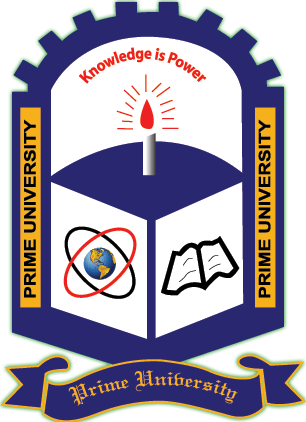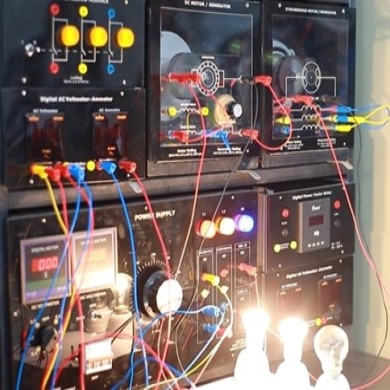
Power System Protection and Switchgear Laboratory
Power System Protection and Switchgear Laboratory is
one of the most developed labs in the Electrical & Electronic Engineering Department.
It is equipped with many advanced apparatus and devices to make all of the
important tests on power systems starting from generation units with control
panel. Also, it has protecting equipment, transmission lines and power factor
correction panel. This laboratory is designed to directly apply theory learned
in lectures to devices that will be studied in the laboratory. Power system
protection is concerned with protecting electrical power systems from faults
within the network by isolating the faulted components remaining the electrical
network operation. Moreover, by properly protecting the system components from
overloading, overvoltage, underfrequency the probability of fires and other
catastrophic system failures can be minimized.
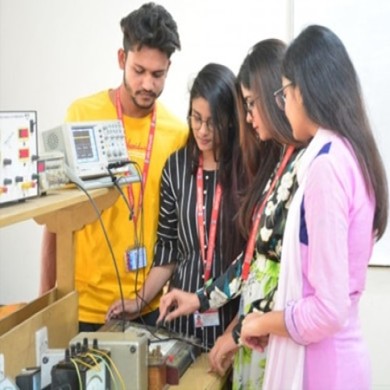
Electrical Circuits Laboratory
The Electrical Circuits lab is one of the
introductory labs in our university that comprises of Direct current (DC) and Alternating
current (AC) Circuits. Students can practice and apply laboratory experiments,
and connect, examine, and analyze electrical circuits. Students can compare
theoretical results with practical results to connect theory and practice.
Students can explore and understand fundamental of electrical engineering
concept. Circuit laboratories are equipped with various devices, such
as: AC/DC power supplies, Watt-meters, Voltmeters, Ammeters, Variable
resistors, Variable inductors, Variable capacitors, Power factor meters.
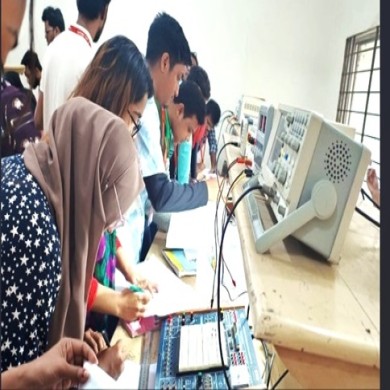
Electronics Laboratory
Electronics laboratory is used
for examining the operating principles of the electronic devices and
obtaining the characteristics of electronic circuit components. Students
can study the design and practical applications of power supplies, diode, amplifiers
such Op-Amp (Operational amplifier), oscillators, Filters, and digital
electronic circuits. From the smallest handheld devices to the complex
machinery used in various industries, electronics have become an indispensable
part of our everyday existence.
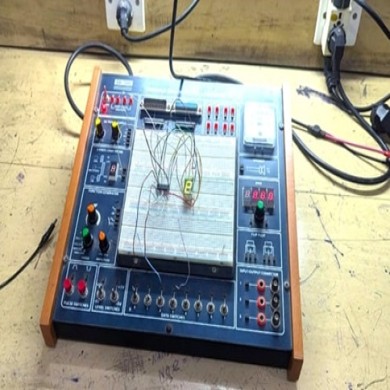
Digital Electronics Laboratory
Digital Electronics Laboratory is important in Electrical and Electronic Engineering (EEE) because it helps students learn the concepts and techniques of digital electronics through hands-on experiments. The main objective of this laboratory is to understand the basics of digital electronics, Boolean algebra and verify the basic gates like AND, OR, and NOT, and universal gates like NAND and NOR. Students will be able to design and analyze the combination of various logic circuits such as half adder, full adder, various types of flip-flops, counter and register. Also, students will realize the structure of various number systems and how they are applied in digital circuits design. Digital Electronics Laboratory is well equipped with hardware and software facilities, such as oscilloscopes, function generators, digital multimeters, digital trainer board, and experimental boxes. Students use these instruments to analyze input and output parameters of different digital circuits
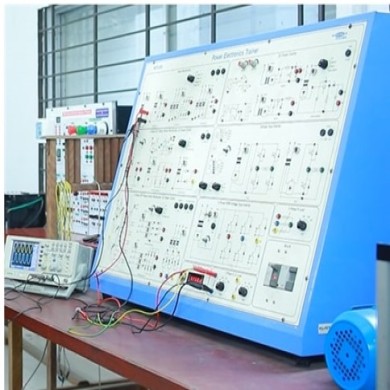
Industrial and Power Electronics Laboratory
Industrial and Power Electronics Laboratory has been
equipped with the fundamental and modern power electronics devices in
order to explore, learn, and understand the applications of the power
electronics in industry. This laboratory introduces the student to measurement
and analysis the important of operating characteristics of power electronic
circuits, power semiconductor devices, direct current (DC) and alternating
current (AC) drives for different load. This provides the basic knowledge in
power electronic converters and operating characteristics of Power Diode, SCR,
MOSFET. The Laboratory
contains the WTS-33A Power Electronics Trainer Kits and Electric drives. The
Trainer Kits include the Power Diode Characteristics, MOSFET Characteristics, SCR
Characteristics, TRIAC Characteristics, Single-phase and three-phase (controlled
and uncontrolled) bridge rectifier, various inverters, various choppers,
cycloconverters, various commutation circuits and different firing circuits.
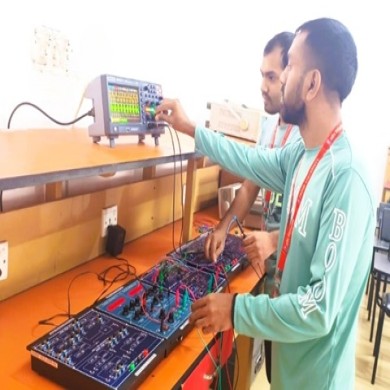
Communication Laboratory
The Communication Laboratory in Electrical and
Electronic Engineering (EEE) is crucial because it provides a practical
platform for students to learn and apply theoretical concepts related to
communication systems. By performing experiments on different analog and digital
modulation schemes (Amplitude modulation and demodulation, Double sideband suppressed
Carrier modulation and demodulation, Single sideband modulation and
demodulation, Frequency modulation and demodulation, Time division multiplexing
and demultiplexing, Frequency division multiplexing and demultiplexing, Analog
to digital converter and digital to analog converter)
and transmission mediums, signal transmission, data transmission, and network
protocols, students gain a deeper understanding of the underlying
principles of communication systems. Students can directly interact with
communication systems components like signal generators, spectrum analyzers,
oscilloscopes, and modulation modules, allowing them to visualize and analyze
signal characteristics in real-time. Overall, a well-equipped communication
laboratory plays a vital role in providing Electrical and Electronic Engineering
students with the practical knowledge and skills necessary to success in the
field of communication engineering.
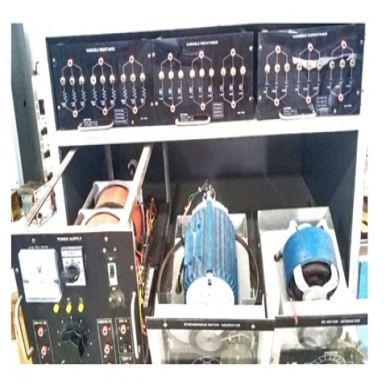
Energy Conversion Laboratory
The Energy Conversion Laboratory provides students
with hands-on experience in the construction, operation, and performance
evaluation of various electrical machines. The lab covers key devices such as
DC Generators and Motors, Alternators, Synchronous Motors, Single-phase and
Three-phase Induction Motors, Special-purpose Motors, and Transformers. Through
practical experiments, students explore the conversion of mechanical energy to
electrical energy and electrical energy to mechanical energy, the operation of
alternators for power generation, and the performance of motors and generators
under different conditions. Students also study the operation of transformers
in voltage regulation and energy transmission. The lab emphasizes efficiency
analysis, motor control techniques, and voltage management, equipping students
with the skills necessary for real-world applications in power generation,
industrial automation, renewable energy systems, and electrical machine design.
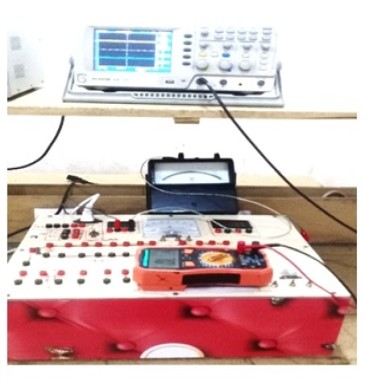
Measurement and Instrumentation Laboratory
Measurement and Instrumentation Laboratory aims at
imparting practical knowledge of the students to familiarize and practice
various measuring instruments and different transducers for measurement of electrical
parameters. This Laboratory is well equipped with various type of test and
measurement instruments like Galvanometer, Ammeter, Voltmeter, Wattmeter,
Energy meter, Variac, Oscilloscope, Wheatstone Bridge and different types of
Transducers. Measurements are the basic means of acquiring knowledge about the
parameters and variables involved in the operation of an electrical system.
Measurement, generally involves using an instrument as a physical means of
determining a quantity or variable. An instrument or a measuring instrument is,
therefore, defined as a device for determining the value or magnitude of a
quantity or variable such as voltage, current, power energy, frequency and
power factor of an electrical system.
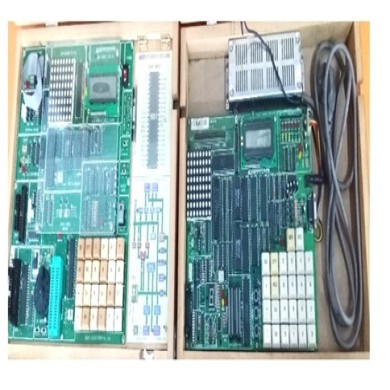
Microprocessor and Interfacing Laboratory
Microprocessor and Interfacing Laboratory is the Fundamental Laboratory in EEE Department. This lab has various types of microprocessors, microcontroller trainer kits, and interfacing modules to demonstrate the detailed applications of microprocessors. The purpose of this laboratory is to train the students to be familiar with the software and hardware of microprocessors so that they can gain enough experience to meet the demands of the microprocessor era. Different exercises in this lab include Serial Data communication between a PC and 8086 microprocessor trainer kit, writing on an EPROM, and programming a microcontroller chip using a UIP. The lab also provides the facility to interface the microprocessor with different circuits such as A/D converters, D/A converters, stepper motors, multidigit displays, DMA, timers, interrupt controllers, etc.
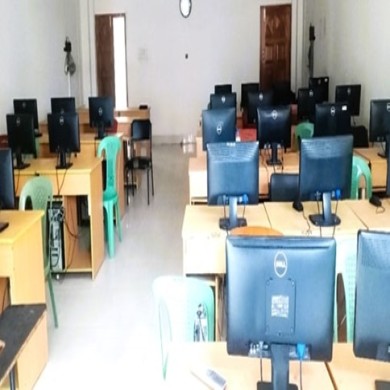
Circuit Simulation Laboratory
The
objective of Circuit Simulation Laboratory in Electrical and Electronic
Engineering is to teach students how to simulate and program electrical
circuits. Students learn how to use software tools like MATLAB, PSPICE, and Multisim
to simulate electrical systems. Also, students use simulation to verify the
theoretical concepts of electrical engineering courses and gain practical
experience with electrical circuits and learn how to use electrical measurement
instruments. At the end of course, the students will be able to acquire
skills of using PSPICE software for Electrical circuit studies. Also, students
acquire skills of using computer packages like MATLAB coding and Simulink in Power
Electronics and power system studies.
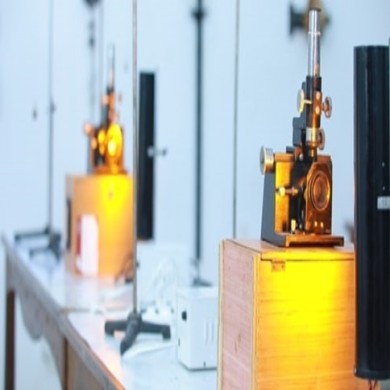
Physics Laboratory
Physics
experiments help the students in understanding the nature of science. This Laboratory imparts the physical basics of
engineering science by means of meaningful experimental setups that provide
valid quantitative measurement results. The main focus of this laboratory is on
dynamics, vibration theory, thermodynamics, acoustics, optics electricity and
magnetism. The experiment of this laboratory offers an opportunity to the
students to familiarize themselves with various instruments, which they read in
theory and this finds application in industry, engineering and everyday life.
